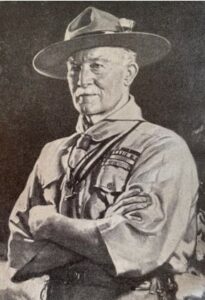

Scouting from small, yet significant beginnings.
 On 31st July to 9th August 1907 Scouting began as a programme for boys aged 11 to 18 with an experimental camp organised by Lord Robert Stephenson Smyth Baden-Powell of Gilwell (known as BP) at an experimental camp for 20 boys on Brownsea Island in Poole Harbour. The camp consisted of 20 boys from a variety of backgrounds, 10 of them were from the Public schools of Eton and Harrow and were the boys of Army friends and other acquaintances of BP while of the remaining ten, 7 were from the Bournemouth Boys Brigade and 3 from the Poole Boys Brigade.
On 31st July to 9th August 1907 Scouting began as a programme for boys aged 11 to 18 with an experimental camp organised by Lord Robert Stephenson Smyth Baden-Powell of Gilwell (known as BP) at an experimental camp for 20 boys on Brownsea Island in Poole Harbour. The camp consisted of 20 boys from a variety of backgrounds, 10 of them were from the Public schools of Eton and Harrow and were the boys of Army friends and other acquaintances of BP while of the remaining ten, 7 were from the Bournemouth Boys Brigade and 3 from the Poole Boys Brigade.
The boys were divided up into 4 Patrols called Curlews, Ravens, Wolves and Bulls. For patrol identification, the boys were given long, wool streamers in different colours to pin on their left shoulder – green for Bulls, blue for Wolves, yellow for Curlews, and red for Ravens. The senior boy in each patrol was assigned as Patrol Leader and was given a flag with the animal of their Patrol on it. Each Patrol Leader was given full responsibility for the behaviour of his Patrol at all times, in camp and in the field. The Patrol was the unit to work or play, and each patrol was camped in a separate area.
The following year Baden-Powell published “Scouting for Boys” issued in fortnightly parts at a cost of 4d. It was an immediate hit and has since sold over 100 million copies. The ideals of Scouting was told in story form which so inspired the youth of the day to form into their own ‘gangs’ and ‘uniform’ based on what they read. This did lead to some issues with regard to unsupervised youngsters going around without a leader. From this BP was persuaded to put the movement on a more organised footing.
In 1916 Wolf Cub Scouts were started for boys under the age of 11, supported by the publication of the “Wolf Cub’s Handbook” and using Rudyard Kipling’s “Jungle Book” as a framework. Many of the names chosen by Wolf Cub leaders were from Jungle Book e.g. Akela (reserved for the leader), Baloo, Bagheere and Kaa.
1st Great Sutton Scout Troop.
The earliest record found of Scouting in Great Sutton is an article from The Chronicle dated 11th March 1916, describing two days of entertainment by the scholars of the St John’s church Eleanor School in aid of the funds for the ‘Boy Scouts’ and ‘Blind Sailors and Soldiers’. “The Headmistress Miss Dumbell presented the Scouts with their one year badges whilst Mr H. Miller, who farmed Church Farm in the village, Scoutmaster gave an address on the “Scout Movement.”
You will be able to explore the groups modern history, from the humble beginnings of our first Wolf Pack in 1945 through to the present day.
Peruse at your pleasure and take yourself back in time to the black and white days and continue the journey right up to the modern age.
It’s not known exactly when 1st Great Sutton Scouts came into being (yet!). This archive material looks into our history at some of the people who in those early days created the solid foundations upon which we now build upon and also those who took their ideals forward. Remembering these people and the things they did is central to ‘who do we think we are?’. Locating good quality photographs of Leaders (so a face can be put to a name) is proving difficult, particularly early in our history, as camera film was not to be wasted and many people did not possess a camera, unlike today in the era of the smartphone. Also Leaders were either behind the camera or hiding!! So, we have some images and stories about each person. It’s as accurate as possible, mainly from personal memories and some old photographs/documents.
Of course, upon reading these stories, if you can provide corrections and/or information about the people mentioned or indeed others we would love to hear from you. Just have a word with any Leader or Committee Member or contact us via our contact page. These stories must be seen as a work in progress as important snippets of information are coming to light continuously. It is very often that insightful ‘gems’ of recall that provide human colour and personalities are revealed.
A story has no beginning or end: arbitrarily one chooses that moment of experience from which to look back or from which to look ahead.
Stories have to be told or they die, and when they die, we can’t remember who we are or why we’re here.
I think the best stories always end up being about the people rather than the event, which is to say character-driven.
(Click on the boxes below to see more)
An explorer, adventurer and TV presenter, Dwayne's been seen in BAFTA nominated Channel 5 series Race to the Pole, on BBC Springwatch, Countryfile, National Geographic and Disney+.
Find out more